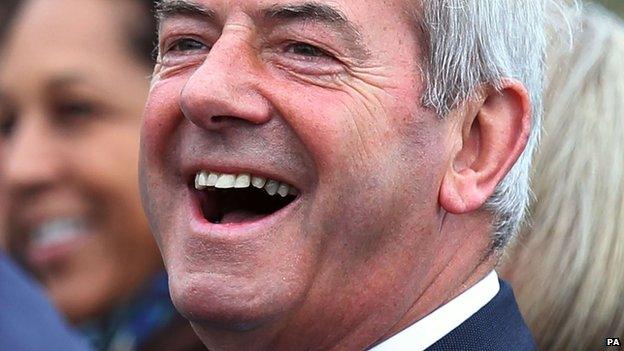Scottish referendum: Who is Lord Smith of Kelvin?
- Published

Lord Smith of Kelvin was involved Glasgow's Commonwealth Games
Lord Smith of Kelvin was appointed to oversee the process of devolving more powers to Scotland. But who is he?
Robert Haldane Smith was born in 1944 in Glasgow - Scotland's biggest city to vote "Yes" in the Scottish independence referendum.
When his home city was selected to host the Commonwealth Games, the Scottish government asked him to be chairman of the organising company.
First Minister Alex Salmond said at the time that Lord Smith had a "proven track record" and "tremendous" experience.
He attended the all-boys Allan Glen's School in Glasgow and after leaving education he entered accountancy, qualifying as a chartered accountant in 1968.
Lord Smith worked at the Royal Bank of Scotland and held senior positions at Charterhouse Development Capital; Morgan Grenfell Private Equity and Deutsche Asset Management.
For more than a decade he was chairman of global engineering company the Weir Group until stepping down in 2013.
The businessman has also held numerous non-executive directorships at MFI, Stakis and Network Rail. He also chairs energy giant SSE.
Two years ago he made the headlines when he was appointed the first chairman of the UK's Green Investment Bank, based in Edinburgh.
In 1999, Lord Smith was knighted and then in 2008 he was given a peerage, becoming an independent cross-bencher in the House of Lords.
Lord Smith has an interest in breeding Highland cattle
He has been chairman of National Museums Scotland and described the opening of the new Museum of Scotland as one of the proudest days of his life.
Lord Smith is also a former ┤¾¤¾┤½├¢ governor, head of the Broadcasting Council for Scotland and chairman of the ┤¾¤¾┤½├¢'s Children in Need.
In 2003, he was invested as chancellor of Paisley University, which became the University of the West of Scotland, and held the role until September last year.
He was installed as chancellor of the University of Strathclyde in October 2013.
The 70-year-old is married with two daughters.
Lord Smith owns Inchmarnock, a small uninhabited island off the west coast of Scotland where he breeds Highland cattle.
He bought it in March 1999 and partnered with Headland Archaeology to carry out a seven-year investigation into the island, covering pre-history, early Christian, medieval and modern times.
At the end of the process, Lord Smith said: "The discoveries have exceeded all my expectations, as has the quality of this scholarly work.
"I have learned a very great deal about the history of Inchmarnock, and grown to love it and respect it and its former inhabitants even more, if that is possible."